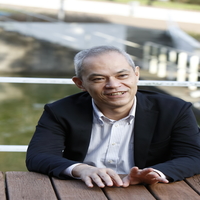Bio
Toshiya Jitsuz umi is Professor at the Faculty of Policy Studies, Chuo University, Tokyo, Japan. He holds an LLB
from the University of Tokyo, an MBA from the Stern School of Business, New York University, and a DSc from the
Graduate School of Global Information and Telecommunication Studies, Waseda University. Before joining Chuo
University, he was a professor at the Faculty of Economics, Kyushu University. Previously, he worked for 18 years at
the Ministry of Posts and Telecommunications (now Ministry of Internal Affairs and Communications [MIC]), Japan.
During 2007- 2008, he was a visiting scholar at the Columbia Institute for Tele- Information, Columbia University, as
an Abe Fellow sponsored by the Social Science Research Council/Japan Foundation Center for Global Partnership.
His research interests include telecommunications/Internet policy, and current focus is on net neutrality and platform
regulation. He has been a member of MIC’S committees on AI network. He served as a vice- chair of OECD Working
Party on Measurement and Analysis of the Digital Economy in 2017, and as a vice- chair of the OECD Committee on
Digital Economy Policy from 2018 to 2019.

